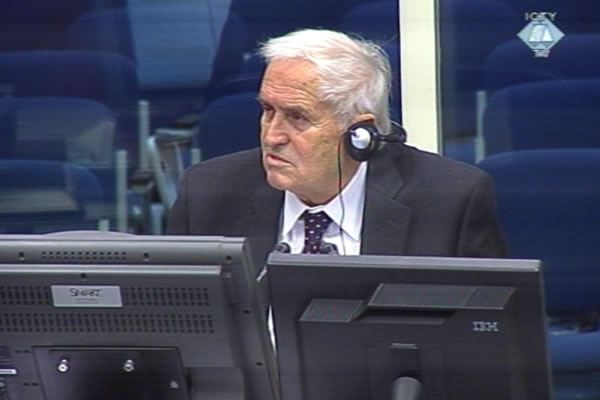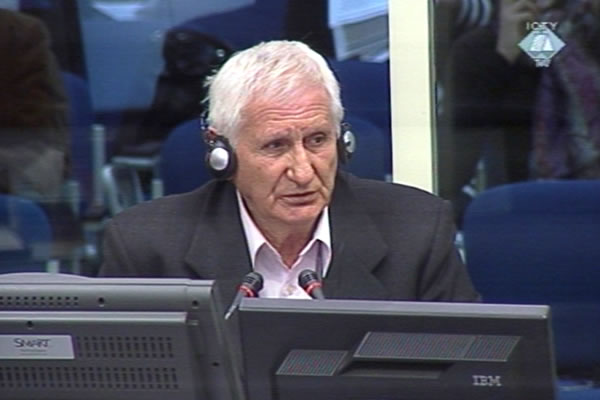Home
BIRMINGHAM ‘CLOSER’ TO SREBRENICA THAN ZVORNIK
The prosecution contested the claims of the former president of the Republika Srpska Supreme Military Court about the efficiency of the local military judiciary during the war. A few days after the massacre in Srebrenica, the British daily The Independent wrote about it in detail, the prosecutor argued, yet the military prosecutors from Zvornik, which was close to the crime scenes, didn’t do anything about the crime
 Novak Todorovic, defence witness of Radovan Karadzic
Novak Todorovic, defence witness of Radovan Karadzic Since the beginning of his defense case, Radovan Karadzic has tried to convince the judges that during the war, Republika Srpska was a well-organized state with the rule of law, where law and order were respected. There may have been some sporadic unsolved crimes against civilians, but this was unavoidable and only to be expected in the wartime, Karadzic argued. Former president of the Bosnian Serb Supreme Military Court Novak Todorovic said in his statement to the defense that on rare occasions when crimes were perpetrated,the military prosecutors and the court tried to rise to the occasion. Todorovic claimed that all crimes were prosecuted regardless of the ethnic background of the perpetrators. In general, the portrayal of the military justice system presented by Todorovic would make countries with the best legal systems proud.
In the cross-examination, prosecutor Nichols destroyed much of that image. First, he put it to the witness that during the war in BH the ‘first, the only and the last’ case with charges of war crimes against the civilian population under the Criminal Code was instituted in the summer of 1993. It was an attempt to prosecute six Serb soldiers for the murder of about 60 Muslims in Velagici near Kljuc on 1 June 1992. The proceedings never really got off the ground. The case is still pending.
Judge Todorovic wasn’t able to contest the prosecutor’s suggestion. However, he did say that the Serb criminals were prosecuted under other provisions in the law. He mentioned a rape case in Bijeljina and ‘the murder of a Czech national in Grbavica’. The prosecutor showed court documents which indicate that the Bosnian Serb army troops were rarely punished. In those rare instances, they received much milder sentences if the murder victims were Muslims rather than Serbs.
The prosecutor put it to the witness that the Republika Srpska military judiciary did ‘just about nothing’ to investigate the crimes committed in July 1995 in Srebrenica. The witness replied that ‘no criminal reports’ for the crimes in Srebrenica had reached the military courts at the time; no one knew about the crimes. This prompted the prosecutor to show an article from the British daily The Independent of 17 July 1995, reporting the mass murders at Branjevo and Kravica farms under the headline Bodies pile up in horror of Srebrenica. ‘You mean to say that mere days after the crime a taxi driver in Birmingham had more information about it than you in Zvornik where the Supreme Military Court was located’, the prosecutor asked. ‘Yes,’ Todorovic responded tersely. This marked the end of his cross-examination. In the re-examination, the witness told the accused that at the time he didn’t read The Independent and the local press didn’t carry any reports about the Srebrenica crimes. There is a problem with the witness’s testimony: the main source of The Independent’s journalist was Belgrade TV network Studio B. On 15 July 1995, Studio B broadcast the footage filmed by Zoran Petrovic Pirocanac, showing a pile of bodies in front of the warehouse in Kravica.
As the hearing continued, Petar Kaurinovic, a crime inspector from Brcko was called to testify. In his statement to the defense, Kaurinovic blamed the crimes in Brcko on the paramilitary formations that ‘de facto held power in the town’ in the first months of the war. As Kaurinovic noted, the situation was resolved when the top Bosnian Serb authorities sent the former federal police inspector Miodrag Davidovic to arrest the offenders. Prosecutor McKenna put it to the witness that the SDS Crisis Staff had invited the paramilitary units to Brcko and that the political leadership decided to deal with them only when they went rogue. She also showed evidence indicating that police officers were involved in the crimes against civilians in the Luka prison camp. One of them was Ranko Cesic, sentenced by the Tribunal to 18 years in prison. The witness said that he knew Cesic from before as a ‘local offender and a bully’ and couldn’t figure out how Cesic ever got a job in the police. The witness agreed reluctantly that the police officers provided security in the Luka prison camp. Kaurinovic said he was aware of only one incident, when a detainee was beaten in the prison camp.
In May 1992, Kaurinovic took part in the effort to identify the bodies of about 60 Muslim civilians exhumed from a mass grave in the Brcko area. Kaurinovic again blamed the paramilitary formations. At the end of the cross-examination, Kaurinovic agreed that the non-Serbs may have left Brcko precisely because of the crimes against them in the Luka prison camp and many other locations in the town, as well as in their homes.
Photos

